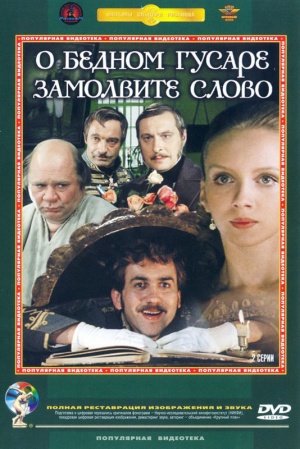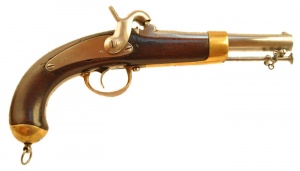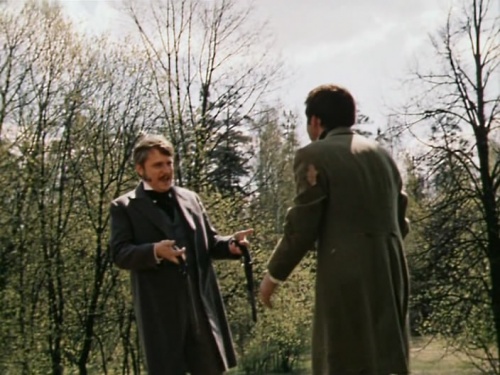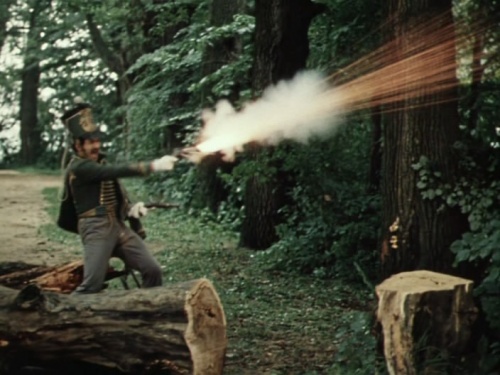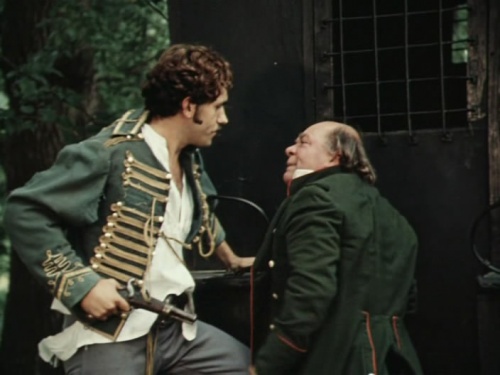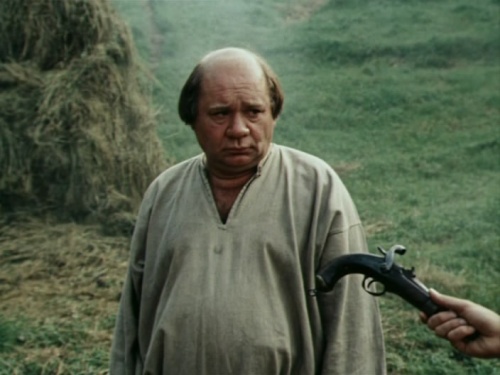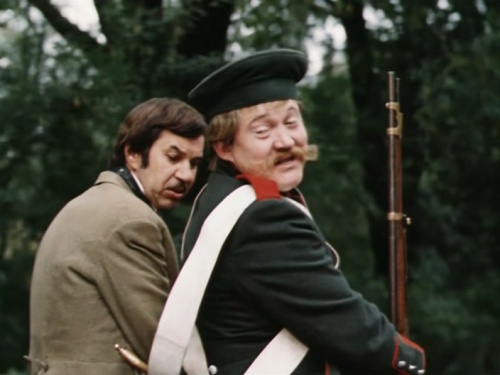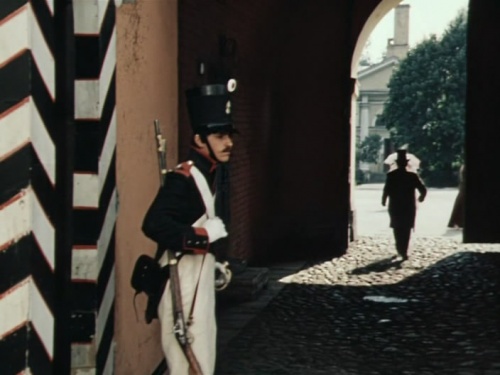From Wikipedia, the free encyclopedia
| Say a Word for the Poor Hussar | |
|---|---|
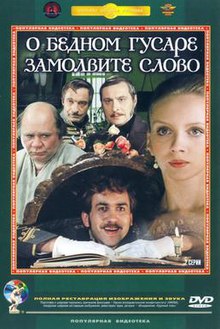 |
|
| Directed by | Eldar Ryazanov |
| Written by | Eldar Ryazanov Grigori Gorin |
| Produced by | Boris Krishtul |
| Starring | Stanislav Sadalskiy Oleg Basilashvili Valentin Gaft Yevgeny Leonov |
| Narrated by | Andrei Mironov |
| Cinematography | Vladimir Nakhabtsev |
| Music by | Andrey Petrov[1] |
|
Production |
Mosfilm |
|
Release date |
January 1981 |
|
Running time |
167 minutes |
| Country | Soviet Union |
| Language | Russian |
Say a Word for the Poor Hussar[2] (Russian: О бедном гусаре замолвите слово),[3] translit. O bednom gusare zamolvite slovo. Literary “Put a good word for a poor hussar”) is a 1981 Soviet film directed by Eldar Ryazanov, shot in the style of a historical tragicomedy.
Plot[edit]
A regiment of hussars arrives at the provincial town of Gubernsk for summer maneuvers. The hussars live a frivolous outside the barracks and away from the metropolitan authorities, enjoying evening shows in the theater, billiards, card games and flirting with the local women. But soon the regiment gets into trouble when Count Merzlyaev arrives from St. Petersburg on the personal orders of the Russian Emperor with a special mission.
Some officers of the hussars regiment are suspected of «free-thinking» and of conspiring against the government. Merzlyaev offers these officers a test: they must shoot a rebel, thus demonstrating their loyalty to the emperor. However, Merzlyaev’s plan to test the officers’ loyalty by an «execution by shooting» is a ruse: the cartridges are blank, and the role of «the condemned conspirator» will be played by a stranger. If the officers refuse to shoot they will face a military court and penal servitude.
For the role of the «conspirator» Merzlyaev hires Bubentsov, an actor who is in jail for stupid carelessness. Merzlyaev’s ruse goes perfectly, but all of a sudden Cornet Alexei Pletnev, one of the officers who should carry out an execution, lets the «rebel» Bubentsov go free.
Merzlyaev is ready to take any action to save his plan and his reputation, to create any abomination, but is unable to defeat love and generosity of honest people…
Cast[edit]
- Stanislav Sadalskiy as cornet Alexei V. Pletnev[4]
- Oleg Basilashvili as count Merzlyaev, privy councilor from St Petersburg
- Yevgeny Leonov as Athanasios Bubentsov, provincial actor
- Irina Mazurkievich as Nastya Bubentsova, provincial actress, Bubentsov’s daughter
- Valentin Gaft as colonel Ivan Pokrovsky, the commander of a cavalry regiment
- Georgi Burkov as Artyuhov, Merzlyaev’s valet
- Zinovy Gerdt as Lev Pertsovsky, dealer parrots
- Victor Pavlov as jailer Stepan
- Boryslav Brondukov as 2nd jailer
- Vladimir Nosik as cornet Simpomponchik
- Valery Pogoreltsev as hussar Lytkin
- Nikolai Kochegarov as 2nd Hussar
- Alexey Shmarinov as 3rd Hussar
- Anatoliy Egorov as 4th Hussar
- Natalya Gundareva as Juju, milliner from the Madame Josephine’s salon
- Svetlana Nemolyaeva as Zizi, milliner from the Madame Josephine’s salon
- Liya Akhedzhakova as Lulu, milliner from the Madame Josephine’s salon
- Valentina Talyzina as Anna Speshneva, provincial actress
- Grigory Shpigel as prompter
- Gotlib Roninson as Mark Mavzon, provincial actor
- Viktor Filippov as Theodore Spiridonov, provincial actor
- Alexander Belyavsky as governor
- Zoya Vasilkova as governor’s wife
- Eldar Ryazanov as confectioner
- Andrei Mironov as narrator (voice)
Music[edit]
The music for the film was written by the prominent Soviet composer Andrei Petrov, who had frequently worked with Eldar Ryazanov. The songs in the film were based on poems of famous Russian poets from different eras: Denis Davydov, Pyotr Vyazemsky, Mikhail Savoyarov, Marina Tsvetaeva, Mikhail Arkadyevich Svetlov. Later, an album of music based on the film was released, which was recorded with the participation of the USSR State Committee for Cinematography Orchestra (conductor Sergei Skripka) and the State Wind Orchestra of the RSFSR.
Filming scandal[edit]
The film proved to be an ordeal for Eldar Ryazanov. The screenplay was written in the summer and autumn of 1978. The State Committee for Cinematography of the USSR did not accept the script, and Eldar Ryazanov brought it to Central Television of the USSR. After a long bureaucratic process the script was adopted into production by Studio Ekran. In autumn 1979 the movie was put into production in the cinematic studio Mosfilm. But soon came the decision that stunned Ryazanov — to shut down the film. In December 1979, Soviet troops entered Afghanistan and the Soviet censors saw the script of the film as a kind of «sedition». Initially, according to the creators, Merzlyaev was a Gendarme officer, but then, at the insistence of the TV authorities, any mention of that Russian «law enforcement agency» should be excluded from the screenplay. Screenplay authors Ryazanov and Gorin were surprised — «Soviet power» that toppled down «damned tsarism» in 1917, in 1979 struggled to protect one of the most hideous manifestations of «tsar’s power» — «political police» represented in the movie by Gendarmes. Despite all his attempts to change the decision of TV authorities, Ryazanov could not do anything.
Then Ryazanov and Gorin made a decision to rewrite the script. The general meaning of the film was immediately distorted, the story developed numerous inconsistencies and logical absurdities. Merzlyaev became an indistinct official with special assignments. To emphasize his involvement in the secret services, he was awarded the rank of Actual Privy Councilor. Such rank, equal to that of the general, in the Russian Empire, could be held only by high-ranking officials of the ministerial level. It looked unlikely that an official of such rank would personally come to a provincial town and get engaged in petty intrigues.
Total control and censorship continued in the course of the filming. In his autobiography Ryazanov tells of flagrant cases of such intervention. For example, in one of the humorous episodes, actor Bubentsov (played by Yevgeny Leonov) was supposed to quote the famous poem by Lermontov: «Farewell, unwashed Russia!». TV bosses noticed the lines: «… And you, blue uniforms, and you, people faithful to them» and considered them as «seditious» hints at the Gendarmes. They ordered a replacement for the poem. Enraged Ryazanov, in vain, shouted in the face of the censors, that this Lermontov’s poem is not an illegal literature and is learned by heart in every Soviet school. In the final version the actor Bubentsov quoted Pushkin’s poem: «I sit behind bars in a damp prison …»
Ryazanov, wrote in his book:
Working over the film «Say a Word for the Poor Hussar» was not only a test for professionalism, it was a test for integrity, honesty and generosity. The content of the movie corresponded to our lives, to our work. The provocations, intrigues, infamies, that were described in our scenario, we had tested on ourselves while shooting the movie. Every scene that was planned to be shot tomorrow, as a rule, was remodel, refined, and appended the day before, which also increased the chaos and confusion on the film set. Perhaps «Say a Word for the Poor Hussar» was my most difficult work. Blows rained down on from all sides, from within and without. [5]
References[edit]
- ^ Дискография Андрея Петрова
- ^ «О бедном гусаре замолвите слово». Kinopoisk.ru. 2013-08-19. Retrieved 2015-11-23.
- ^ «О бедном гусаре замолвите слово (1980) — информация о фильме — советские фильмы — Кино-Театр.РУ». Kino-teatr.ru. Retrieved 2015-11-23.
- ^ Дубль семь. Несыгранные роли ЖЖ Станислава Садальского. 1 августа 2014
- ^ Эльдар Рязанов «Заэкранье» Воспоминания Retrieved 2009-09-17.
External links[edit]
- O bednom gusare zamolvite slovo at IMDb
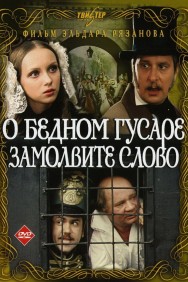
The small town agog Hussars entry. Love between cornet and the young actress suddenly faces intrigue made by a St. Petersburg bureaucrat. The actress father dies after being involved in this game and perspectives look dark… But evil will eventually be defeated by the nobility, loyalty and love.
Watch Say a Word for the Poor Hussar Online Free
Say a Word for the Poor Hussar Online Free
Where to watch Say a Word for the Poor Hussar
Say a Word for the Poor Hussar movie free online
Say a Word for the Poor Hussar free online
+ We are updating this movie. Sorry for
this inconvenience.
This movie is one of my favorites. It’s extremely intelligent, funny, hilarious, sad, musical, graceful, nostalgic, beautiful comedy, with brilliant actors, incredible script, and a very special mood.
The plot takes place in 19-th century in a military hussar regiment, which spends few days in a provincial Russian town. A high profile Secret Service agent has a task to investigate if this regiment is loyal to the Tzar. The agent finds an actor who agrees to play a role of a captured rebel. Agent’s plan is to test regiment’s hussars ordering them to execute (shoot to death) this false rebel. Everything is staged, but hussars think it’s a real execution…
It’s about honor, friendship, love, youth. It shows in depth few terrific characters, it makes you think and feel, and laugh. On the surface it’s a satire against Czar Russia, but this satire is even more relevant for any totalitarian society and especially for Soviet Union. Acting in this movie is unbelievably great, so is the script and the story.
Also most importantly: unlike many other Soviet movies, you do NOT have to be Russian to understand and enjoy its humor and points.
О бедном гусаре замолвите слово,
Ваш муж не пускает меня на постой.
Но женское сердце нежнее мужского,
Но женское сердце нежнее мужского,
Но женское сердце нежнее мужского,
И сжалиться может оно надо мной.
Я в доме у Вас не нарушу покоя,
Скромнее меня не найти из полка.
И если свободен ваш дом от постоя,
И если свободен ваш дом от постоя,
И если свободен ваш дом от постоя,
То нет ли хоть в сердце у Вас уголка.
О бедном гусаре замолвите слово,
Замолвите слово.
About the poor hussar say a word ,
Your husband will not allow me to wait .
But a woman’s heart more tender male ,
But a woman’s heart more tender male ,
But a woman’s heart more tender male ,
And it may take pity on me .
I’m in the house you do not break dormancy ,
Modest I did not find out the regiment .
And if your house is free from billeting ,
And if your house is free from billeting ,
And if your house is free from billeting ,
That is not there even in the corner of you heart.
About the poor hussar say a word ,
Say a Word .
| Скажи слово бедному гусарам | |
|---|---|
 |
|
| Режиссер | Эльдар Рязанов |
| Произведено | Борис Криштул |
| Написано | Эльдар Рязанов Григорий Горин |
| В главных ролях | Станислав Садальский Олег Басилашвили Валентин Гафт Евгений Леонов |
| Передал | Андрей Миронов |
| Музыка от | Андрей Петров [1] |
| Кинематография | Владимир Нахабцев |
|
Производство |
Мосфильм |
|
Дата выхода |
Январь 1981 |
|
Продолжительность |
167 минут |
| Страна | Советский союз |
| Язык | русский |
Скажи слово бедному гусарам[2] (русский: О бедном гусаре замолвите слово…,[3] транслит. О бедном гусаре замолвите слово) 1981 год Советский фильм режиссер Эльдар Рязанов. Фильм снят в стиле исторической трагикомедии.
участок
А гусары полковой перегар в провинциальный город Губернск на лето маневры. Легкомысленная жизнь вне бараков, вдали от столичных властей, вечерние представления в театре, бильярд, карточная игра, флирт с дамами — такова жизнь гусар в провинциальном городке. Но вскоре полк попадает в беду. Из Санкт-Петербург, по личному приказу император С особым поручением приезжает граф Мерзляев.
Некоторые офицеры полка подозреваются в «свободное мышление » и из заговор против правительства. Мерзляев предлагает этим офицерам испытание: они должны застрелить мятежника, тем самым продемонстрировав свою верность императору. Хитрый план Мерзляева состоит в том, что «расстрел «ложно: картриджи пустой, а роль «осужденного заговорщика» исполнит незнакомец. Если офицеры отказываются стрелять — они предстают перед военным судом и каторга.
На роль «заговорщика» Мерзляев нанимает Бубенцова, актера, сидящего в СИЗО за глупую невнимательность. «Игра» Мерзляева идет отлично, но вдруг в нее вмешивается человеческий достоинство. Корнет Алексей Плетнев (один из офицеров, который должен играть роль палачей) отпустил «бунтаря» Бубенцова. И это начинает превращаться в трагедию …
Пытаясь спасти свой план и свою репутацию, граф Мерзляев готов пойти на любые действия, создать любую мерзость. Но он не может победить любовь и щедрость честных людей …
Бросать
- Станислав Садальский в качестве корнет Алексей Васильевич Плетнев[4]
- Олег Басилашвили в качестве граф Мерзляев, тайный советник из Санкт-Петербурга
- Евгений Леонов в качестве Афанасиос Бубенцов, провинциальный актер
- Ирина Мазуркиевич в качестве Настя Бубенцова, провинциальная актриса, дочь Бубенцова.
- Валентин Гафт в качестве полковник Иван Покровский, командир кавалерийского полка
- Георгий Бурков в качестве Артюхов, камердинер Мерзляева
- Зиновий Гердт в качестве Лев Перцовский, дилер попугаев
- Виктор Павлов в качестве тюремщик Степан
- Борислав Брондуков в качестве Второй тюремщик
- Владимир Носик в качестве корнет Симпомпончик
- Валерий Погорельцев в качестве гусар лыткин
- Николай Кочегаров в качестве 2-й гусарский
- Алексей Шмаринов в качестве 3-й гусарский
- Анатолий Егоров в качестве 4-й гусарский
- Наталья Гундарева в качестве Жужу, модистка из салона мадам Жозефины
- Светлана Немоляева в качестве Зизи, модистка из салона мадам Жозефины
- Лия Ахеджакова в качестве Лулу, модистка из салона мадам Жозефины
- Валентина Талызина в качестве Анна Спешнева, провинциальная актриса
- Григорий Шпигель в качестве суфлер
- Готлиб Ронинсон в качестве Марк Мавзон, провинциальный актер
- Виктор Филиппов в качестве Теодор Спиридонов, провинциальный актер
- Александр Белявский в качестве губернатор
- Зоя Василькова в качестве жена губернатора
- Эльдар Рязанов в качестве кондитер
- Андрей Миронов в качестве рассказчик (голос)
Музыка
Музыка к фильму написана выдающимся советским композитором. Андрей Петров. Этот композитор неоднократно работал с Эльдаром Рязановым. Песни в фильме написаны на стихи известных поэтов разных времен: Денис Давыдов, Петр Вяземский, Михаил Савояров, Марина Цветаева, Михаил Аркадьевич Светлов. Позже был выпущен диск, записанный при участии Государственный комитет СССР по кинематографии оркестр (дирижер Сергей Скрипка ) и Государственный духовой оркестр РСФСР.
Съемочный скандал
Фильм стал тяжелым испытанием для Эльдара Рязанова. Сценарий был написан летом и осенью 1978 года. Государственный комитет по кинематографии СССР сценарий не приняли, и Эльдар Рязанов принес его Центральное телевидение СССР. После долгого бюрократического процесса сценарий был принят в производство. Студия Экран. Осенью 1979 года фильм был запущен в производство на киностудии. Мосфильм. Но вскоре пришло ошеломившее Рязанова решение — закрыть фильм. В декабре 1979 г. Советские войска вошли в Афганистан а советские цензоры рассматривали сценарий фильма как своего рода «крамола «. Изначально, по мнению создателей, Мерзляев был Офицер жандармерии Но тогда, по настоянию телекомпании, любое упоминание этого российского «правоохранительного органа» следует исключить из сценария. Авторы сценария Рязанов и Горин были удивлены — «Советская власть», свергнувшаяся, «проклята». царизм » в 1917, в 1979 году изо всех сил пытался защитить одно из самых ужасных проявлений «царской власти» — «политическая полиция «В фильме представлены жандармы. Несмотря на все попытки изменить решение телевизионных властей, Рязанов ничего не смог сделать.
Тогда Рязанов и Горин приняли решение переписать сценарий. Сразу был искажен общий смысл фильма, в рассказе появилось множество несоответствий и логических нелепостей. Мерзляев стал невнятным чиновником с особыми поручениями. Чтобы подчеркнуть свою причастность к секретным службам, ему было присвоено звание действительного тайного советника. Такой ранг, равный рангу Общее, в Российской Империи, могли проводить только высокопоставленные чиновники министерского уровня. Вряд ли чиновник такого ранга лично приедет в провинциальный городок и будет заниматься мелкими интригами.
В ходе съемок продолжались тотальный контроль и цензура. В автобиографии Рязанов рассказывает о вопиющих случаях подобного вмешательства. Например, в одном из юмористических эпизодов актер Бубенцов (его играет Евгений Леонов) должен был процитировать знаменитое стихотворение А. Лермонтов: «Прощай, немытая Россия!». Телебоссы обратили внимание на строчки: «… А вы, синие мундиры, и вы, верные им люди» и посчитали их «крамольными» намеками на жандармов. Заказали замену стихотворению. Разъяренный Рязанов напрасно кричал в лицо цензорам, что это стихотворение Лермонтова не является нелегальной литературой и выучено наизусть в каждой советской школе. В финальной версии актера Бубенцова цитирует Пушкин Стихотворение: «Сижу за решеткой в сырой тюрьме …»
Рязанов писал в своей книге:Работа над фильмом «Скажи слово бедному гусарам» была не только проверкой на профессионализм, но и на порядочность, честность и щедрость. Содержание фильма соответствовало нашей жизни, нашей работе. Провокации, интриги, подлости, описанные в нашем сценарии, мы опробовали на себе при съемках фильма. Каждая сцена, которую планировалось снять завтра, как правило, переделывалась, дорабатывалась и добавлялась накануне, что также увеличивало хаос и неразбериху на съемочной площадке. Пожалуй, «Скажи слово бедному гусарам» было моей самой сложной работой. Удары обрушились со всех сторон, изнутри и снаружи. [5]
Рекомендации
- ^ Дискография Андрея Петрова
- ^ «О бедном гусаре замолвите слово». Кинопоиск.ру. 2013-08-19. Получено 2015-11-23.
- ^ «О бедном гусаре замолвите слово (1980) — информация о фильме — советские фильмы — Кино-Театр.РУ». Kino-teatr.ru. Получено 2015-11-23.
- ^ Дубль семь. Несыгранные роли ЖЖ Станислава Садальского. 1 августа 2014 г.
- ^ Эльдар Рязанов «Заэкранье» Воспоминания Проверено 17 сентября 2009 г..
внешняя ссылка
- О бедном гусаре замолвите слово на IMDb
| Say a Word for the Poor Hussar (O bednom gusare zamolvite slovo) |
|||||||||||||||||||||||||||||
|---|---|---|---|---|---|---|---|---|---|---|---|---|---|---|---|---|---|---|---|---|---|---|---|---|---|---|---|---|---|
DVD Cover |
|||||||||||||||||||||||||||||
|
Say a Word for the Poor Hussar (original title O bednom gusare zamolvite slovo) is a Soviet 1980 made for TV historical tragicomedy movie directed by Eldar Ryazanov. In mid-19th century Russia Count Merzlyaev (Oleg Basilashvili) is sent with a special mission to a hussar regiment, based in a provincial town. Several hussar officers are suspected of participation in a conspiracy, and Merzlyaev has a plan to test them. The most important element of this plan is an actor Afanasy Bubentsov (Evgeni Leonov) who has to appear in the role of a «conspirator».
The following weapons were used in the film Say a Word for the Poor Hussar (O bednom gusare zamolvite slovo):
Percussion Cap Pistol
Various Percussion Cap Pistols are seen in hands of Cornet Aleksey Pletnyov (Stanislav Sadalskiy) and some other hussar officers (Vladimir Nosik, Valeriy Pogoreltsev, Nikolay Kochegarov), Colonel Ivan Pokrovsky (Valentin Gaft) and Count Merzlyaev (Oleg Basilashvili). In the climactic scene Afanasy Bubentsov (Evgeni Leonov) holds a pistol.
Russian M1854 Naval percussion cap pistol — .71 caliber
Merzlyaev hands two pistols to his manservant Artyuhov (Georgiy Burkov). These pistols have longer barrels than the service army pistols.
Artyuhov cleans the pistols and puts them in case.
Pletnyov fires a pistol with enormous flash.
Merzlyaev hands a pistol to Bubentsov.
A close view of the pistol.
Infantry Musket M1845
Soldiers and prison guards, including jailer Stepan (Viktor Pavlov), are seen with percussion cap muskets that appear to be Russian M1845s. In the climactic scene Cornet Aleksey Pletnyov (Stanislav Sadalskiy) grabs a musket.
Russian percussion cap musket M1845 — .70
Pletnyov grabs a musket from a gendarme.
Say a Word for the Poor Hussar is a Soviet movie from 1980. It was directed by Eldar Ryazanov and featured an all-star cast, including Evgeniy Leonov, Oleg Basilashvili, Valentin Gaft, Georgiy Burkov, and many others.
Set in the middle of XIX century, the movie starts with an investigator of a very high rank arriving in a small town, following a report that a few hussars from the regiment currently stationed there were badmouthing the king. He invents a perfect � as he thinks � test that would show their true allegiance. However, the commander of that regiment, despite being only aware of certain parts of this plan, considers it a great dishonor for his men and devises a plan of his own. Things get complicated as neither plan works exactly as intended.
Caught in a crossfire are two actors from the local theater, a father and a daughter.
The film premiered on Soviet television on January 1, 1981, and wasn’t shown again for several years due to Soviet censorship understanding it correctly.
Tropes in Say a Word for the Poor Hussar:
- Agent Provocateur: Merzlyayev originally plans to turn Artyuhov and, later, Bubentsov into one, more or less. He resorts to a version on Unwitting Pawn when that fails.
- Band of Brothers: Hussars, Pletnyov and four of his friends in particular. On of the main things that motivate Pletnyov to commit treason is that it would save his friends from dishonor.
- Better to Die than Be Killed: An edge case. Bubentsov has no desire to die, but doesn’t want hussars to be forced to be his executioners, and shoots himself because of that.
- Bittersweet Ending: Protagonists manage to thwart Merzlyayev’s evil plans, but at a great cost: one of them is dead, the other is demoted and sent into exile.
- Bookends: In the beginning of the movie, save for a short prologue, a hussar regiment enters the town. In the end, the same regiment is leaving the town.
- In the beginning, one of the hussars rides his horse into a house and emerges with a girl. In the end he rides into the same house with a girl, and comes back alone.
- Both times a black cat crosses the hussars’ path. First time the colonel decides to proceed, ignoring a bad omen; second time, however, he turns to a different route.
- Breaking the Fourth Wall: At the end, all main characters except for the one who is dead take turns looking directly at the camera and explaining what happens with them later. Several even describe their deaths.
- Creator Cameo Ryazanov himself appears in a small role of a pastry chef.
- While Ryazanov did have a habit of playing small parts in his own movies (not all of them, but a significant part), he, according to his autobiography, did not indend to appear in this one. But the actor who was supposed to play this part came in very drunk, barely able to stand upright. Ryazanov decided to save the day by playing it himself.
- Chivalrous Pervert: Pletnyov. He has troubles understanding why some ladies might not want him, and won’t stop pursuing them just because of that, but he would always wait for an explicit «yes».
- Deliberate Values Dissonance: When colonel Pokrovsky mentions that his hussars do not read books or newspapers and don’t have any «ideas», both him and count Merzlyayev consider this a good thing.
- Duel to the Death: Pletnyov challenges Merzlyayev to one. The latter treats this like a baby tantrum.
- A Father to His Men: Colonel Pokrovsky. His whole world revolves around the hussars in his regiment. He goes as far as committing treason for their sake.
- The hussars, in their turn, have a lot of respect to him, and he is well aware of that. Near the end of the movie, gendarmes are going to use force on him; he calmly remarks that they would fail, and is immediately proven to be correct, as his men move to defend him even without his order.
- False Confession: Bubentsov makes one, for a variety of reasons: he wants to keep Pletnyov‘s respect, he doesn’t want Merzlyayev to win, and it’s difficult for him to break his act.
- Faux Action Girl: In-Universe. Nastya briefly pretends to be one, attempting to shift the blame from Pletnyov and her father to herself. Merzlyayev sees right through it.
- Gambit Pileup: The whole plot. First count Merzlyayev invents a seemingly perfect plan. Colonel Pokrovsky tries to counteract with a plan of his own. Neither plan works; Bubentsov, caught in crossfire, tries a couple of plans of his own, also not quite successfully. At some point, Merzlyayev asks «Can somebody explain how we got here?»
- Gender Reveal: A rather humorous example. When gendarmes interrupt a dress rehearsal, they are very confused by a female actress playing Cicero and a male actor playing an unnamed woman.
- Heroic Sacrifice: Twice by the same guy, in rapid succession, both times failing. But then he dies anyway.
- Hidden Depths: Bubentsov and Pletnyov. Both start as careless guys, happily oblivious to evils of the world they live in. Both make right choices at a great personal cost.
- Hooker with a Heart of Gold: Zhuzhu aka Zina. She helps Nastya wake up very drunk Pletnyov; later, she visits him in a hospital and brings him some treats.
- Ladykiller in Love: Pletnyov eventually does develop deep feelings for Nastya.
- Left the Background Music On: Inadvertently inverted. Most of times when there is music in the movie, it’s either something the charaters do not hear at all, or something with a very clear source � for example, when Pletnyov is playing a guitar. However, there is one scene near the very end, where we clearly see a drum-major directing an regiment’s orchestra, but there is no music.
- Major Injury Underreaction: Pletnyov gets mauled by a bear. He enjoys some rest in a hospital, but seems to be doing fine, not even losing his appetite.
- Military Salute: Hussar regiment salutes Pletnyov at the end of the movie, clearly recognizing his demotion as unfair. Pletnyov returns the salute with a tear in his eye.
- Mood Whiplash: Second part of the movie is much darker than the first. What started as a lighthearted comedy, ends with one of the hero’s death.
- Mother Russia Makes You Strong: Averted, despite the movie being set in Russia. Hussars in general and Pletnyov in particular are not badasses because of harsh Russian conditions; they are army elite.
- One-Man Army: Guys in the regiment say one Pletnyov is worth ten ordinary soldiers. It’s probably true.
- Polly Wants a Microphone: One of the subplots involves a bird seller, who, by mistake, bought a parrot, who kept screaming «King is a fool!» Before long, all his parrots were repeating the same thing, and one even took it further, screaming things like «Down with the king!» Authorities are not pleased.
- Robotic Torture Device: A humorous example. At some point the Torture Technician suggests using a certain «English machine» on a prisoner. First, it turns out the device doesn’t work, probably because he never read the instruction manual (as it doesn’t have a Russian version). Later he succeeds in making it work… on himself.
- Screw the Rules, I’m Doing What’s Right!: Pokrovsky’s counterplan is very illegal and can get him and Pletnyov in big trouble. Neither of them cares much, especially since this plan, successful or not, should save other hussars from dishonor, which all of them consider as Fate Worse than Death.
- Staged Shooting: Merzlyayev’s original plan.
- Title Drop: The name of a movie is also a line in a song Pletnyov sings near the middle of the movie. This song, however, is not directly related to the events of the movie.
- Vodka Drunkenski: Artyuhov isn’t shown as drunk, but is implied to be a heavy drinker. His Breaking the Fourth Wall segment at the end reveals that drinking caused him to freeze to death.
- What Could Have Been: In-Universe. At a certain point, closer to the end of the movie, Bubentsov muses that if it wasn’t for a small misstep he made in the beginning, all the craziness won’t happen. He is wrong: there is a very high chance that he would still get in prison and all the events would play out pretty much as they did, with the exception that some other hussar would take Pletnyov’s place. But Pletnyov isn’t much different from other hussars, so, it won’t be a big difference.
- Wicked Cultured: Merzlyayev. He is very polite, has a good taste in music, quotes poetry, at the same time ruining lives with his manipulations.

